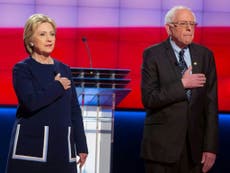Why do we treat American nationalism as a harmless pageant? It's nothing of the sort
We treat US nationalism as harmless, even enviable, pageantry – until it comes to Trump


We live, we keep being told, in a globalised world where concerns and priorities are increasingly the same. From the phenomenon of the “squeezed middle” to migration, via the democratic deficit, the impact of the social media and the threat from terrorism, the developed world is trying to get to grips with a common political agenda.
So why, in Britain and much of Europe, is US politics covered so differently from our own? Why is it written and spoken about in different categories, and with different vocabulary? Why does it seem so often to be placed in quite a different box? Nowhere is the divergence more apparent than in a presidential election year, and this election year is no exception. It may even offer a vintage example of what, in any other context, might be called a double standard.
Now it can, and will, be argued that the US political scene really is different, and merits being discussed in different terms from the ones used in Britain and Europe. It is true that the primary system, the protracted campaign, the imperative for grassroots engagement – all those small campaign rallies in private homes and school halls – the repeated trials by televised debate, and above all the vast amounts of money required by almost anyone running for office in the US, make an American election a different and vastly more theatrical animal from one in Europe.
But does that degree of difference extend to the politics? I don’t think it does. Take just three examples.
The surge in populism that can be seen this year in the United States, from both left and right, has much in common with the recent rise enjoyed by Ukip and Jeremy Corbyn’s Labour in the UK, and by equivalent trends elsewhere in Europe. So much has been observed. Less remarked upon is that, for all the cultural differences, the root causes are very similar on both sides of the Atlantic: a sense that the traditional political class is privileged and out of touch; the stagnation, or decline, in pay suffered by the many; and a feeling that the country has been changed – either by money or newcomers – to an extent, and with a speed, that ordinary voters have had no say in.
Yet British and European coverage of the US campaign reserves a tone of approval for the aspirations of Hillary Clinton’s lagging rival, Bernie Sanders, that it would never (or only grudgingly) allow to Corbyn. Even though their actual policies are very similar, Sanders is treated as representing a strange mix of down-home and exotic in a way that Corbyn never would.
Next: nationalism. How often do you hear the term “nationalism” applied to the United States or US politics? You hear it applied to aspects of European politics almost daily, usually articulated with a supercilious air. In Europe today, nationalism is identified with the extreme right. It incorporates chauvinism, identity politics and – with migration so much the concern – outright xenophobia. But those very same traits might seem to an outsider to be the very stuff of the US mainstream. All that flag-waving tends to be seen from this side of the Atlantic as something rather admirable – evidence of a national pride that perhaps we could do with more of.
But where is the boundary between the flagpole on your lawn and America “uber alles”? American children sing the national anthem with gusto and recite the Pledge of Allegiance at school every morning. You will hear European Amero-philes wish that we had some equivalent nation-building devices. The citizenship test and ceremony were introduced in the UK as a generally positive attempt to fill that perceived gap.
But what if the UK and other European countries publicly characterised themselves as “exceptional” – as the United States by and large still does? The line would surely have been crossed from healthy patriotism to unhealthy nationalism. After all, it is national exceptionalism that causes politicians and parties, such as the French National Front, the German Alternative fur Deustchland and to a slightly lesser extent Ukip, to be branded “nationalist” in a pejorative sense.
President Obama has tried, as Bill Clinton did, to prepare the US for a world where it might no longer be top dog, but it was none other than loyal Democrat, Madeleine Albright, who said, in defence of the US use of military force, that “We are the indispensable nation. We stand tall. We see further into the future.” The distance from here to Trump-ism is not as great as it may sometimes seem. Nationalism is almost a default political position in the US. But not only do Americans not call it nationalism, we Europeans shrink from calling it that, too. We treat the whole caboodle as harmless, even enviable, pageantry – until it comes to Trump, that is, who articulates similar sentiments with more red-neck crudeness, when we worry that an irresponsible “clown” might be elected president.
And thirdly, right-wing. Even now, the United States remains generally more socially conformist than the UK or most West European democracies, and quicker to see dissent of any stamp as treachery. But because the centre of American politics is to the right in European terms, you have to be pretty right-wing to be regarded as an extremist. Yet this difference tends to be neglected in British and European coverage of US politics; we tend to accept American definitions of right-wing and extremism on their terms, rather than trying to translate.
Do the words matter? I think they do, because in exempting the United States – almost uniquely – from terms that carry highly negative connotations in mainstream European politics, we criticise too little and flatter too much. The image thus projected back here is of a rollicking participatory democracy, which is some way away from the truth. We also give US politicians – unless they are as brazen as Trump – a free pass on expressions of national chauvinism that we would not ignore in others.
Yes, there are aspects of America’s lively politics that we can import, but the real differences need to be acknowledged first.



Join our commenting forum
Join thought-provoking conversations, follow other Independent readers and see their replies